RELATED CONTENT

It makes sense that many eyewear and eyecare companies ground their social purpose initiatives in the industries in which they work and are most familiar. To give back to vision-related charities is invaluably important across the globe—and, for many of these companies, just makes perfect sense.
Through vision-based social purpose initiatives, the eyecare and eyewear industries are able to bring the gift of sight to people both locally and on a global level, and companies big and small do their part in equal measure—all for a greater vision.
One of the leaders in this effort is VSP Eyes of Hope, an organization fully funded by VSP Global which supports communities by providing access to eyecare, eyewear and disaster relief where it’s needed most. Working with VSP network doctors, VSP Eyes of Hope initiatives have provided access to no-cost eyecare and eyewear for more than 2.5 million people in need.
In August, Eyes of Hope teamed with GLAM4GOOD to host in Paradise, Calif., a unique back-to-school experience for 300 students and teachers, many of whom lost everything in the Camp Fire that had swept through the community months earlier.
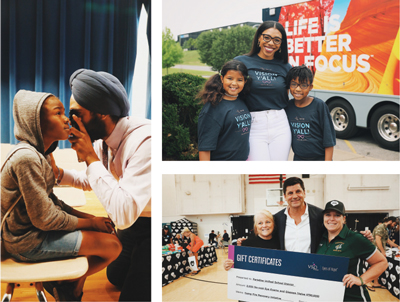
|
|
VSP Eyes of Hope helped students and teachers of Paradise, Calif., who lost homes and / or personal items in the Camp Fire devastation.
|
|
|
|
VSP Eyes of Hope and GLAM4GOOD worked with local volunteer VSP network doctors and community volunteers who were also affected by the Camp Fire to provide hundreds of students and teachers with free eye exams, glasses, new wardrobes, accessories and personal care essentials. In total, more than $1 million worth of goods and services were gifted by the two organizations, according to an announcement at the time.
VSP Eyes of Hope is supported by 8,500 VSP network doctors, who are annually involved with providing support and access to care to those in need. In addition, 119,000 community members affected by disaster have gained access to eyecare and replacement eyewear, VSP noted.
“VSP Eyes of Hope is core to our mission of helping people see,” Michael Guyette, president and chief executive officer of VSP Global, said. “By partnering with VSP network doctors, we’re able to bring access to no-cost eyecare and eyewear where it’s needed most, including those disadvantaged by income, disaster or distance.”
Also working to support schools and students this year was the Essilor Vision Foundation, which has now provided more than 1 million pairs of eyeglasses to individuals in need since its debut in 2007. In July 2019, Essilor Vision Foundation awarded the one-millionth pair of glasses to adorable first-grader Khloe, whom the foundation said represents the estimated 10 million children in the U.S. who can’t see clearly and need vision care.
In recognition of hitting the one million mark, the Foundation launched its year-long “One Million Magic Moments” campaign, noting that “every time a child like Khloe receives a pair of eyeglasses, magic happens.” Glasses provide magic moments throughout a child’s life, from seeing the board in school and catching a ball to seeing a loved one’s smile, the Foundation noted. This campaign celebrates these magic moments experienced by children across the U.S. who can proudly say “I am one in a million.”
“Many people cannot imagine living in a world where everything is blurred, and may be surprised to learn that one in four children in the U.S. has a vision problem that’s significant enough to affect their ability to learn,” said Becky Palm, president and executive director of the Foundation. She also noted that the Foundation encourages eyecare professionals, teachers, parents and their communities to become advocates for vision care to help millions more.
| 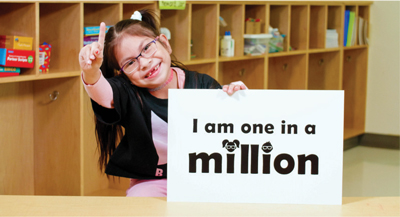
|
| Essilor Vision Foundation provided its 1 millionth pair of eyeglasses earlier this year to first-grader Khloe.
|
|
|
Among the other highlights of Essilor Vision Foundation’s efforts this year was the work under the “Changing Life through Lenses” program, which provides free frames and lenses for patients in need when an OD donates an eye exam. As of late November, more than 2,000 ODs were enrolled in the program, serving patients with 125,000 pairs of glasses.
The year 2019 also was a milestone year for the Alcon/Orbis International partnership, which celebrated the 40th anniversary of the partnership during an Orbis eyecare program in Mandalay, Myanmar. “In addition to its longevity, this partnership is notable because of its scope,” a spokeswoman told Vision Monday.
“We support Orbis with product donations (including equipment and consumables), monetary donations and volunteers. The Flying Eye Hospital has a surgical suite fully outfitted with Alcon equipment and Alcon biomedical technicians travel to Orbis programs to train participating eyecare professionals on our equipment. We also support Orbis’ hands-on training programs, as well as content development for online learning courses,” the spokeswoman added.
In 1979, Alcon and Orbis began partnering to help people in developing countries where blindness is widespread. Nearly 90 percent of the world’s blind and visually impaired people live in low- and middle-income countries and have limited access to health care services.
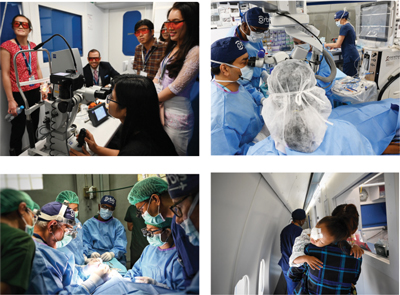
|
|
In 1979, Alcon and Orbis began their partnership to help people in countries where blindness is widespread, and earlier this year they celebrated 40 years of working together.
|
|
|
|
Orbis is a non-governmental organization dedicated to saving sight worldwide by training eye professionals in underserved communities. Alcon biomedical engineers and technicians share their technical skills and knowledge to help Orbis partners operate and maintain equipment and local eyecare infrastructure.
In addition, the Alcon Foundation sponsors Orbis training programs in countries that include China, Ethiopia, India, Indonesia, Mongolia, Myanmar, Panama, Peru and Vietnam.
On the retail side of optical, the Eyeglass World unit of National Vision produced 48,000 pairs of eyeglasses annually as part of a new “Made Locally, Given Globally” program, which was piloted in 2019 and launched this year nationwide. Here’s how it works: When a customer makes an eyeglass purchase at Eyeglass World, the retailer handcrafts a pair of eyeglasses in its in-store lab in a prescription that is most needed around the world. These custom-made glasses are then donated to those in need in countries around the world.
The program is run in partnership with 20/20 Quest, a National Vision sponsored charitable foundation. The eyeglasses are distributed to people in need around the globe via partners at RestoringVision, according to a spokeswoman.
National Vision also is active in the U.S. with local community outreach, including an Atlanta school event with its America’s Best Contacts & Eyeglasses business segment. And as part of its #Giving Tuesday support, America’s Best stores reach out in their local communities to help kids in need during the holiday season. Each store has been given vouchers to use in local, community outreach with local schools, social workers and school nurses, among others.
National Vision also is a key supporter of Boys & Girls Clubs of America. “We think of ourselves as a fast-growing business engine that, in turn, also fuels a fast-growing philanthropic mission,” chief executive officer Reade Fahs said. “We partner with organizations like the Boys & Girls Clubs of America and a number of schools to bring exams and glasses to lower-income children in America, and we partner with VisionSpring and RestoringVision to address the problem of the lack of affordable glasses in low income communities throughout the world.”
2019 also was a busy year for independent nonprofit OneSight, which counts new clinic locations, the completion and transfer of a permanent, self-sustaining vision care infrastructure and its first public art installation as some of the year’s highlights.
In May, OneSight and National Geographic hosted a global vision care panel that brought together several thought-leaders to consider topics such as defining lack of access, explaining the impact of clear sight, the implications of technology, and the role of public-private partnerships. In addition, Pulitzer Prize winning and National Geographic photographer, Stephanie Sinclair, chronicled and showcased her favorite images from aOneSight expedition through the Amazon and Rwanda.
| 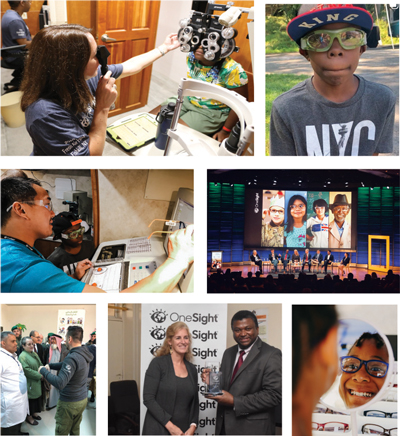
|
| OneSight had a very busy 2019, which included signing a major vision care arrangement with The Gambia.
|
|
|
“Looking back, 2019 has been a pivotal year for OneSight and the vision care cause,” K-T Overbey, president and executive director for OneSight, told Vision Monday. “Our MOU signing in The Gambia was more than a moment—it was the realization of years of work, a collaboration of local and global partners and a testament to our sustainable clinic model. Armed with the learnings from this successful pilot program, we’re planning to complete our second country in 2020 and scale the model to bring access to those in need around the world.”
She added, “As we’ve dedicated ourselves to permanent and equitable access through our sustainable programming, we’ve also addressed immediate need through our charitable clinics, focusing especially on displaced and migrant populations in Jordan, Thailand and Colombia.
TOMS, who made waves first as a one-for-one shoe company, extended the same practice to their eyewear in 2011. For each pair of frames purchased, TOMS contributes toward full eye exams, sight-saving surgeries, prescription glasses or medical treatments for underserved populations. So far, a company spokesperson told Vision Monday, “TOMS’ eyewear sales have contributed to more than 780,000 sight restorations and established 37 sustainable vision centers.”
TOMS dedicates efforts to a variety of social purpose initiatives in addition to their ne-for-one eyewear model. Recently, the company rolled out an End Gun Violence Together campaign, calling for an end to the gun violence epidemic in the U.S., and the company has provided over 722,000 weeks of safe water for those who lack access through their TOMS Roasting Co. coffee sales.
141 Eyewear also employs the one-for-one model, giving a new pair of glasses to a person in need for each 141 pair purchased. 141 donates the same glasses they sell, and many of 141’s donated frames go to the Seattle/King County Clinic—an event at the Seattle Center which brings together a variety of health care organizations, civic agencies, non-profits, volunteers, and businesses for a four-day free health clinic.

|
|
141 Eyewear co-founder Kyle Yamaguchi helps a child find new glasses at the Seattle/Kings County Clinic.
|
|
|
|
A company spokesperson told Vision Monday that 141 has donated 1,500 frames to the Seattle/King County Clinic each year for the past four years. The spokesperson explained that opticians who receive their donations are often “thrilled to have 141 donate so many frames since the quality and style of our frames work so much better for their patients than the second-hand and old/discontinued product they were used to receiving.”
In addition, many of 141’s accounts use 141 frames as part of their own community outreach programs. A company spokesperson explained, “I think they appreciate that we are giving the same frame they are selling off their own boards—so they know they can give away a good quality product to folks in need within their very own community… At the end of the day, we all want to do well and we all want to improve our community.”
Pearle Vision also is active in the effort to provide eye exams to school children through its ABSee program, which was launched as a collaborative effort by Pearle Vision and nonprofit OneSight earlier this fall. ABSee is on a mission to provide eye exams and glasses to children in neighborhoods across North America where Pearle Vision EyeCare Centers are located. ABSee provides no-cost access to eyecare and corrective eyewear to children. On World Sight Day, volunteers from Pearle Vision and OneSight worked together to provide eye exams and glasses to hundreds of students at Earle Brown Elementary School in Brooklyn Center, Minn., the first of 10 planned vision care clinics.
ABSee clinics already have been held in Las Vegas, Minneapolis and Chicago with life-changing results – hundreds of children in need went home with the glasses they needed the same day. One in four children has an undiagnosed vision issue, according to the American Optometric Association.
| 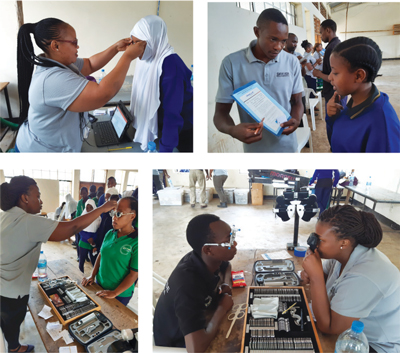
|
| SkyGen International Foundation has provided more than 100,000 Tanzanians with free vision tests since 2018.
|
|
|
SkyGen International Foundation, the philanthropic arm of health care benefits technology company SkyGen USA, also works toward improving communities around the world, primarily in Tanzania. Since July 2018, SkyGen International has provided more than 100,000 Tanzanians with free vision tests and distributed more than 22,500 pairs of free prescription glasses.
Executive director Lisa Sweeney, who previously had been chief financial officer of SkyGen USA, said the organization will continue to expand its reach to even more regions of the East African country in the coming years.
“We could not be more honored and humbled to make positive changes to people’s lives through these vision services and glasses,” Sweeney said. “Being able to see can be the difference between being employed or unemployed, getting an education or not getting an education. By enabling people to see, we’re able to make extremely impactful changes to individuals, their families and, ultimately, entire communities throughout Tanzania,” she said.